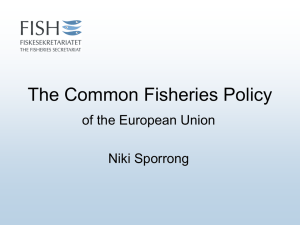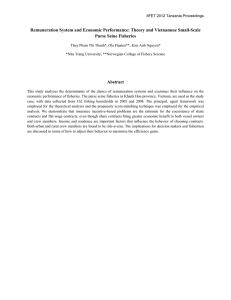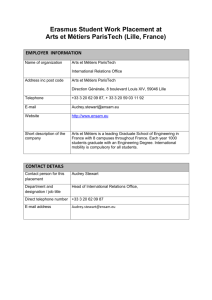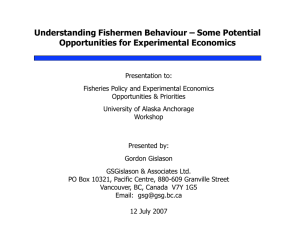What strategic choices do fishermen make?
advertisement
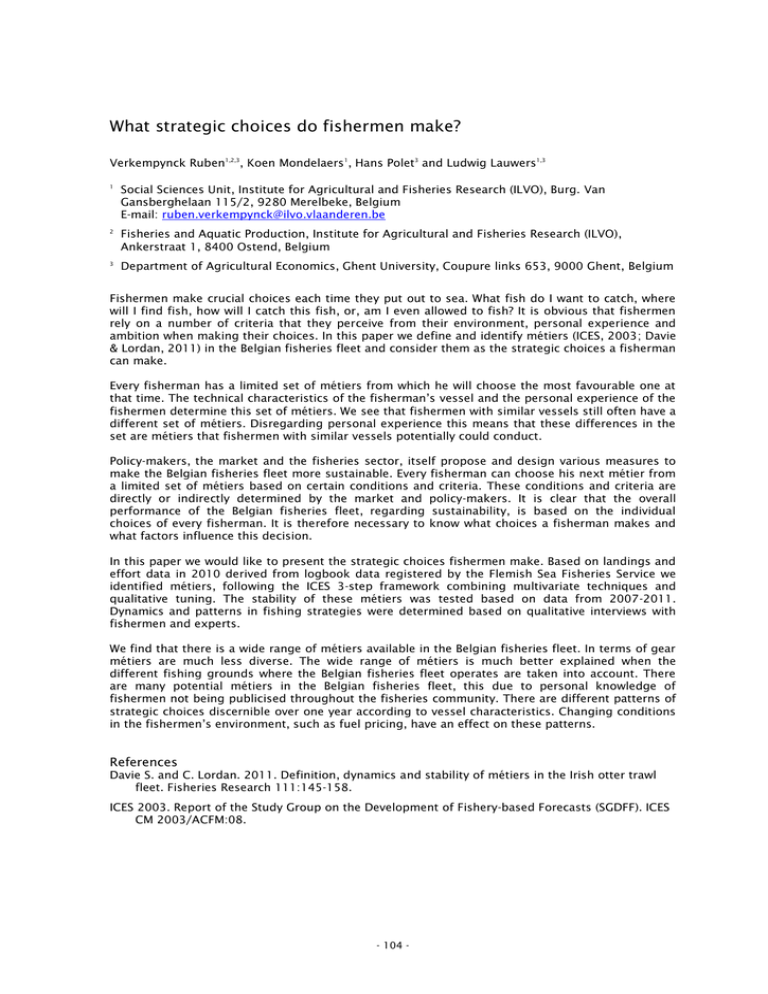
What strategic choices do fishermen make? Verkempynck Ruben1,2,3, Koen Mondelaers1, Hans Polet3 and Ludwig Lauwers1,3 1 Social Sciences Unit, Institute for Agricultural and Fisheries Research (ILVO), Burg. Van Gansberghelaan 115/2, 9280 Merelbeke, Belgium E-mail: ruben.verkempynck@ilvo.vlaanderen.be 2 Fisheries and Aquatic Production, Institute for Agricultural and Fisheries Research (ILVO), Ankerstraat 1, 8400 Ostend, Belgium 3 Department of Agricultural Economics, Ghent University, Coupure links 653, 9000 Ghent, Belgium Fishermen make crucial choices each time they put out to sea. What fish do I want to catch, where will I find fish, how will I catch this fish, or, am I even allowed to fish? It is obvious that fishermen rely on a number of criteria that they perceive from their environment, personal experience and ambition when making their choices. In this paper we define and identify métiers (ICES, 2003; Davie & Lordan, 2011) in the Belgian fisheries fleet and consider them as the strategic choices a fisherman can make. Every fisherman has a limited set of métiers from which he will choose the most favourable one at that time. The technical characteristics of the fisherman’s vessel and the personal experience of the fishermen determine this set of métiers. We see that fishermen with similar vessels still often have a different set of métiers. Disregarding personal experience this means that these differences in the set are métiers that fishermen with similar vessels potentially could conduct. Policy-makers, the market and the fisheries sector, itself propose and design various measures to make the Belgian fisheries fleet more sustainable. Every fisherman can choose his next métier from a limited set of métiers based on certain conditions and criteria. These conditions and criteria are directly or indirectly determined by the market and policy-makers. It is clear that the overall performance of the Belgian fisheries fleet, regarding sustainability, is based on the individual choices of every fisherman. It is therefore necessary to know what choices a fisherman makes and what factors influence this decision. In this paper we would like to present the strategic choices fishermen make. Based on landings and effort data in 2010 derived from logbook data registered by the Flemish Sea Fisheries Service we identified métiers, following the ICES 3-step framework combining multivariate techniques and qualitative tuning. The stability of these métiers was tested based on data from 2007-2011. Dynamics and patterns in fishing strategies were determined based on qualitative interviews with fishermen and experts. We find that there is a wide range of métiers available in the Belgian fisheries fleet. In terms of gear métiers are much less diverse. The wide range of métiers is much better explained when the different fishing grounds where the Belgian fisheries fleet operates are taken into account. There are many potential métiers in the Belgian fisheries fleet, this due to personal knowledge of fishermen not being publicised throughout the fisheries community. There are different patterns of strategic choices discernible over one year according to vessel characteristics. Changing conditions in the fishermen’s environment, such as fuel pricing, have an effect on these patterns. References Davie S. and C. Lordan. 2011. Definition, dynamics and stability of métiers in the Irish otter trawl fleet. Fisheries Research 111:145-158. ICES 2003. Report of the Study Group on the Development of Fishery-based Forecasts (SGDFF). ICES CM 2003/ACFM:08. - 104 -
